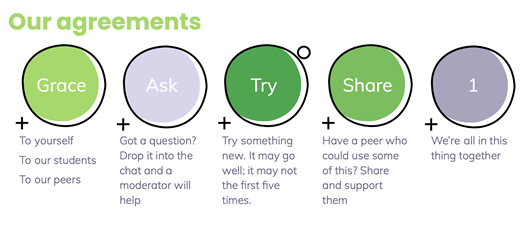VaSCL Virtual Workshops
on Learning Technology Integration
VaSCL offered a series of forty-three Virtual Workshops on Learning Technology Integration from April 20, 2020 to August 5, 2020. The goal of these one-hour virtual workshops, which were offered at NO CHARGE to VaSCL members, was to help enable teachers to use virtual technologies more effectively to support remote learning by students.
These Learning Technology Integration Virtual Workshops were designed to introduce participants to specific “boots on the ground” instructional strategies and applications that could immediately be put to use in working with students while they were at home during the Coronavirus crisis this spring. The skills and tools that the over 6,500 registered participants acquired during these virtual workshops over the spring and summer will also be of great benefit as educators reimagine “schooling” and develop strategies for providing effective and engaging virtual and/or blended learning opportunities for all of their students during the 2020-2021 school year.

The recording of each Virtual Workshop may be viewed below.
Google Classroom 101 (Grades K-12)
Brand new to Google Classroom? Want to see how you can foster efficient learning and feedback? This is the session for you! Participants in Classroom 101 can start off as complete novices and end with their very own class ready to use with students. Users will need access to a G Suite for Education account.
Topics include:
- Creating a class
- Making Assignments
- Organize your class with topics
- Adding students
- Themes
Google Classroom 201 (Grades K-12)
Learn how to supercharge your Google Classroom as we build an organized and responsive class. We’ll look at setting up your class, adding different types of resources, and giving enriching feedback, as well as other tips and tricks. This workshop is designed for educators who have some experience or familiarity with Google Classroom.
Topics include:
- Different types of posts
- Organize your class with topics
- Other ways to bundle learning for students
- Creating quizzes and importing their results
- Giving feedback in assignments
- Mobile app
- Future updates that will come your way
Google Classroom (Grades K-12)
This workshop is designed for educators who have some experience or familiarity with Google Classroom. All participants should have created a class prior to the session. Participants who are not already familiar with Google Classroom can learn how to create a class by following this link [youtu.be/xUF9c5sk4YY]. During this session we’ll explore how to add different types of resources, give enriching feedback, invite parents to participate, and use Google Meet, as well as learn other tips and tricks that will super-charge your Google Classroom.
#AllStudentsCan: Assistive Tech & UDL that You Can Use Tomorrow (Grades K-12)
Our goal as educators is to serve all of our students -- regardless of their learning abilities, skills or needs. This session focuses on simple and easy tools that all teachers can leverage to improve learning for all of their students.
Topics will include:
- Accessibility features in commonly used education tools like Google and Flipgrid
- Chrome Extensions that provide simple access for all
- Other tips and tricks
Choice Boards & Hyperdocs (Grades K-12)
Districts around the country are emphasizing the importance of instructional flexibility and student interests and curiosity over prescribed lesson plans. By using Choice Boards and Hyperdocs, teachers can facilitate learning that straddles the line between structured standards and flexibility while emphasizing a holistic, child-centered experience for our learners. Participants will explore examples of Choice Boards & Hyperdocs, review best practices, and receive multiple templates to use.
Continuing Community from Home with Hangouts Meet & Flipgrid (Grades 4-12)
One of our biggest opportunities while remote teaching is connecting with our students to lend a sense of normalcy. Both Hangouts Meet & Flipgrid are simple, safe, free, and cross-platform resources that you can use to check in with your students and create synchronous or asynchronous conversations. Plus, both are full of accessibility tools that you’ll love. Examples will be differentiated by grade bands.
Google Docs & Google Slides (Grades K-12)
In this session, participants will get an overview of how both Google Docs and Google Slides work, as well as some instructional design challenges to try out. Topics covered will include getting started in Drive, creating a new file, basic features of Docs and Slides, as well as challenges. This session will also touch on accessibility features that are built into these two Google tools, research strategies that make everything easier, and other best practices.
Google Forms (Grades K-12)
Google Forms is one of Adam Seipel’s favorite tools. From simple back to school, to contact logs and weekly check-ins, to self-grading quizzes, Google Forms has become the go-to tool for many educators -- and it will soon be yours too. Participants will learn how to create a form, add questions and question types, create quizzes, share the form, review responses, as well as complete challenges.
Google Sites (Grades K-12)
This session is perfect for the beginner who has never built a website before. However, it will also be very useful for someone with some experience, who would like to learn more about best practices for their classroom website. Topics covered will include creating a site, organizing the content and pages, adding and embedding resources, and publishing your website. During the course of the session, you will have become a Google master, learning how to use an awesome mix of Slides, Docs, and YouTube videos on your website. By the end of this session, you will have your own website full of different types of content that you can share with your students and their families.
Choice Boards & Hyperdocs - Deep Dive
(Grades K-12)
Have you ever looked at a Choice Board or Hyperdoc and thought, “This is GREAT, but it doesn’t quite fit what I’m working on in class.”? In this session, participants will build upon their basic knowledge of Choice Boards and Hyperdocs, so the introductory CB & HD workshop and/or prior familiarity with Choice Boards and Hyperdocs are prerequisites for effective participation in this workshop. During this workshop, participants will be given the tools necessary to “remix” a template to fit their needs, as well as the tools needed to create a Choice Board or Hyperdoc from scratch. Time will be provided during this session for design and creation
Creating Community (Grades K-12)
Getting Started with the New Year (Grades K-12)
Adam Seipel
Presenter of Learning Technology Integration Virtual Workshops

Since 2008, I have shared my love of education with K-12 teachers and administrators in my work to support their instructional needs and aspirations. In fall of that year, I started helping other teachers in my former district incorporate Google Sites, Docs, and other tools into their instruction. Later, I continued introducing educators to Google Apps by piloting a 1:1 Chromebook program in my high school English class, in which my students self-published an anthology of their own writing.
Today I work in Albemarle County Public Schools where I am a Learning Technology Integrator. I have the pleasure of working alongside teachers to help them make curriculum accessible to students. In my work to coach, support, and model integration of technologies into learning, I focus with fellow teachers on actively engaging students in experiences grounded in equity and deeper learning. I am currently focused on aligning ed tech practices with the research-based concepts from John Hattie’s Visual Learning studies. Additionally, I have my Master’s degree in Instructional Technology, and I am a Google Certified Trainer and a Google Certified Innovator. I have been fortunate to present workshops at a number of state and national conferences and support school districts across the country to assist teachers in implementation of Google Classroom. Currently, it is my mission to support educators to create and offer quality learning opportunities to students who are home as a result of the current pandemic."
